There is an interesting prevalence of stories about parents and children in science fiction. Stories that could be loosely defined as proto-science fiction (or at least speculative fiction) date back to Ancient Greece, and possibly even further. The famous myth of Icarus and Daedalus is about the invention of new technology (wings for human flight) and the dangers of hubris (flying too close to the sun)—two recognisable staples of the genre as we know it today.
The story, of course, centres on a father and son. Icarus’ death is the most commonly retold part of the myth, but a crucial aspect is the lengths Daedalus goes in order to provide a better life for his son. As if it really were a science fiction story, this aspect of their relationship is represented by the creation of new technology. Moreover, one of the earliest science fiction novels—Johannes Kepler’s Somnium(1634)—is in part about the relationship between a boy and his mother (who happens to be a witch).
As a genre, science fiction seems particularly well-equipped to tell stories about parent-child relationships. Why? One hypothesis is that it is because science fiction stories are often about hope for a better future—the more optimistic side of the genre anticipates the triumph of human compassion and technology (e.g. Star Trek). A simple way to represent hope for the future is through the birth of a new generation, as represented by the ‘innocent child’ character.
What saddens me is not so much the things we’ve lost, as the things the babies will never have the chance to know. — John Wyndham, The Day of The Triffids
Alternatively, science fiction’s focus on the creation of new technology often deals thematically with the dangers and responsibilities of creation in general. In the wake of the atomic bomb (and more recently, artificial intelligence) it has become more important than ever to tell stories about taking responsibility for our creations. This is easily represented in parent-child relationships—characters who are sent into space to save the planet often contemplate whether their greatest responsibility is to Earth or their own progeny. In these stories, humanity is the parent.
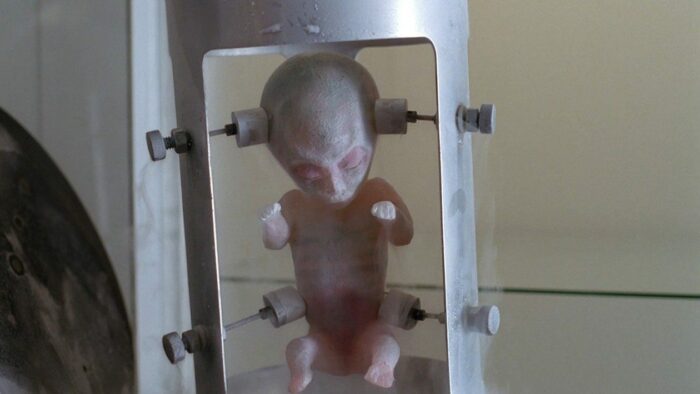
In other cases, humanity is the child. Our innate need for a father figure is at the heart of religion, and perhaps even science’s eager search for the origins of life. Joseph Campbell’s monomyth (or ‘the hero’s journey’) puts all heroes in the role of ‘the child’, positing that it is reconciliation with the father figure that stands between the hero and enlightenment. The science fiction aspects of a story become the vehicle through which the storyteller can dissect complex interpersonal relationships. The parent-child conflict is enlarged to the scale of life and death, the fate of the galaxy, and interplanetary war, functioning a macrocosm of the child’s feelings of abandonment or betrayal.
Past and Present Archetypes
Mary Shelley, author of Frankenstein, is arguably the mother of modern science fiction. Frankenstein is a novel about the crimes of a reanimated corpse and a cautionary tale about the responsibilities of a parent. The tragedy of the story arises from the fact that the eponymous doctor abandons his creation—the ensuing chaos is a result of his failure. This genre-defining work recognises the correlation between the role of a scientist and a parent (and indeed a writer): those with powers of creation must show respect and compassion for their progeny, or else they should not use those powers in the first place.
Dominic Cobb (Leonardo DiCaprio) from Inception is the antithesis of Dr Frankenstein, as he goes to extraordinary and dangerous lengths to be reunited with his children. The infamous ambiguity of the final scene is all about whether or not he achieves this. Christopher Nolan’s masterpiece takes the hero’s journey very literally—Fischer (Cillian Murphy) goes into his actual subconscious in order to confront his father. In glorious sci-fi style, Inception makes introspection a physical reality, and true to the monomyth, Cobb finds that what he knew all along was true—the most important thing he can do is return to his family.
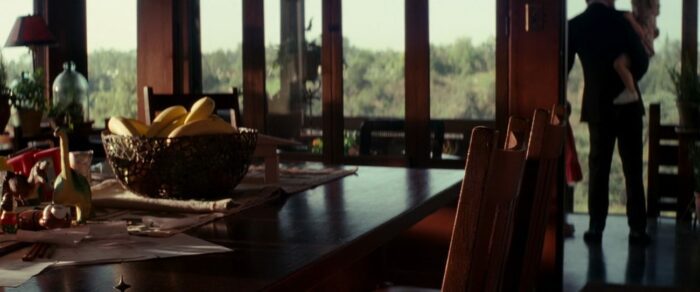
Matthew McConaughey’s character in Interstellar faces a terrible dilemma: either stay at home and risk the fate of mankind, or try to save the world but miss watching his children grow up. Here, the genre has allowed Nolan to take the issue of parental responsibility to a shattering extreme. The emotional heart of the movie exists in the broken bond between Cooper and his daughter Murph; they are separated by space, time, and Murph’s feelings of betrayal. It is all captured in a single heartbreaking word: “Stay”.
Interstellar also typifies the ‘hope for a better future’ strand of science fiction: At the climax of the movie, it is revealed that it was Murph, not Cooper, who was fated to save the world all along. Because of time dilation, Murph is much older than her father when they are reunited, and in a subversion of the hero’s journey, the parent must atone to the child in order to achieve closure.
They didn’t choose me, they chose her. — Cooper, Interstellar
Similarly, Back to the Future uses time travel to invert the parent-child relationship. Marty McFly (Michael J. Fox) does what no child can imagine doing: He meets his parents as teenagers. He becomes his father’s confidant and wingman, rather than the other way around. Time travel encapsulates two things: the joy of scientific advancement and the ability to do the impossible. In this case, the impossibility is a child who tries to understand his parents as peers and witnesses them falling in love.
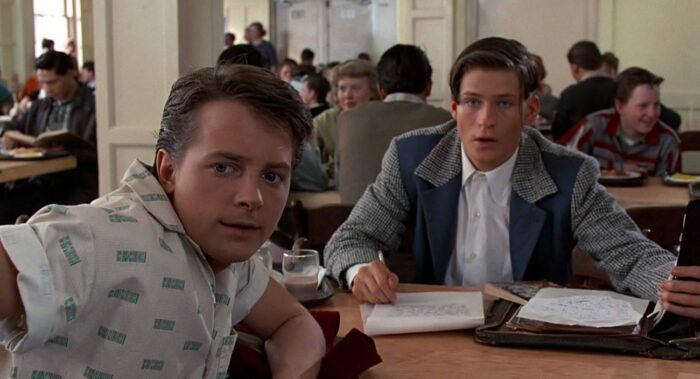
John Krasinski’s A Quiet Place centers on family unity for reasons greater than just logical plot convenience. Krasinski and Emily Blunt had a young family of their own when Krasinski first received an early version of the script, which greatly influenced his final product. A Quiet Place combines science fiction with horror to communicate the vulnerability of new parents. The birth of the new Abbott baby represents the persistence of life (in this sense, and others, it is comparable to John Wyndham’s novel The Day of the Triffids), as well as the fact that the family is slowly moving on from the trauma of Beau’s death. The first instalment is largely about responsibility, and in particular sacrifice (culminating in the heartbreaking death of the father), whereas the sequel is more about legacy and the future, as the family’s daughter (played by Millicent Simmonds) essentially goes on a save-the-world quest.
Betrayal and Belonging in Star Wars
“I am your father” is one of the most famous lines (and plot twists) in movie history. The Star Wars saga is closely based on the hero’s journey and is a veritable melting pot of dysfunctional family relationships. It is told mostly from the perspective of children—Luke, Rey, Jyn—who do not know or have been separated from their parents; they must reconcile themselves with the actions of their parents and forge their own identity in their absence. Star Wars is a generational story in more ways than one—there’s something meta about the fact that the children who went to see the original trilogy with their parents are now taking their own kids to see the new movies.
The social and political topsy-turvy-ness of the 20th century plays out across alien planets in Star Wars. Viewing the original trilogy as an allegory, Darth Vader may not just be a ‘Dark Father’, but a ‘Dark Uncle Sam’. In the wake of the Vietnam War and the disillusionment that followed, the audience is asked to view the father figure not as a hero or protector, but as something evil, capable of terrible destruction.
However, there are as many good parents in the Extended Universe as there are bad. In the sequels, we have Han Solo and Leia—estranged from their rogue son Ben (or Kylo Ren), they never give up trying to bring him back to them. The Mandalorian centres on the adorable found-family dynamic of Din Djarin and Grogu. Rey finds a reluctant role model in Luke and sibling figures in Poe and Finn, proving that even though biological parents are not guaranteed, it is possible to find a place to belong anyway.
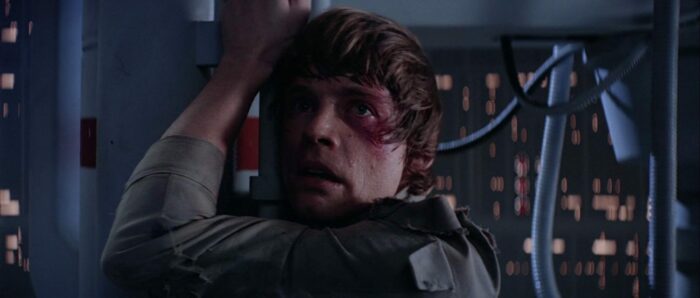
The Impossible Family in The X-Files
From the outset, the mythological arc of The X-Files is driven by a sibling relationship, but it increasingly becomes one about parenthood. The leading duo, Mulder and Scully, struggle both individually and together with parent-child relationships. Agent Mulder (David Duchovny) meets and is disappointed by a carousel of father figures. This is significant in several ways, including the wider theme: the ambiguity of truth that manifests in the uncertainty of Mulder’s parentage, and symbolism of the father as an untrustworthy authority figure in a story about government conspiracies.
The Erlenmeyer Flask (first appearing in an episode of the same name) contains an alien fetus—proof of extraterrestrials and recognisable as a symbol of new life. However, far from representing hope, the Erlenmeyer Flask embodies only the selfishness and villainous ambition of the Syndicate. The X-Files uses a common trope from science fiction and abduction lore–that of human experimentation, particularly using women as incubators. During her abduction in Season 2, Agent Scully (Gillian Anderson) is experimented on and ultimately rendered infertile. Several plotlines arise from Scully’s desire to be a mother, and all the various torturous ways she is denied; when Scully does become pregnant with William, it is referred to more than once as a “miracle”, which is a word not to be taken lightly in The X-Files universe.
The monster-of-the-week episode ‘Terms of Endearment’ is about a demon who wants to start a ‘normal’ family but keeps producing demon babies. The nuclear family that Mulder finds in ‘Dreamland’ is meant to show the contrast between what he and most people consider to be ‘normal’. Of all the paranormal things that are made possible in the universe of The X-Files, the one thing it is impossible to be is ‘normal’. As much as Mulder wants to find his sister and reunite his once-perfect family, and as much as Scully wants to be a mother, they can’t. The truth is that family is alien to some.
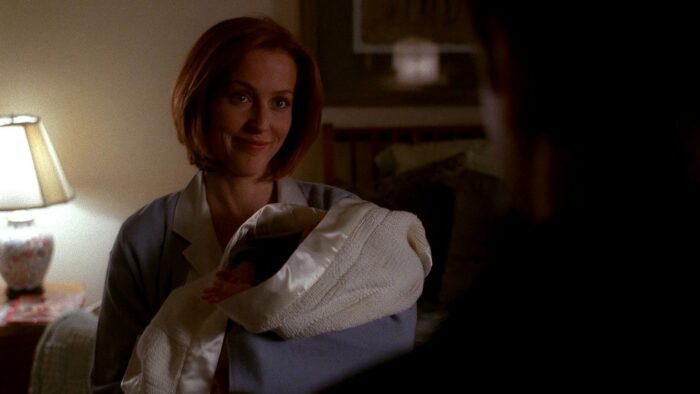
No Matter of Biology
He may have been your father, boy, but he wasn’t your daddy. — Yondu, Guardians of the Galaxy Vol.2
Science fiction gives people the ability to travel through space, wield godlike power, or spend a lifetime exploring the mysteries of the universe. But what is it that people come home to? What would matter most to a person who can do all those things?
Well, what matters to many people is their biological family—though of course, not to all. Increasingly it seems there are stories about people who become a family rather than being born into one. Take The Umbrella Academy, a show about unrelated siblings who are even more dysfunctional than most and yet stand by each other because only they can understand the unique burdens of their sci-fi upbringing.
In a genre that thrives on the abnormal, traditional societal conventions should be of little concern. What makes a parent a parent? Wasn’t Obi-Wan Kenobi a better father figure than Anakin Skywalker?
David Harbour’s character in Stranger Things—Jim Hopper—becomes the adopted father of Eleven (Millie Bobby Brown) whose combined trauma and superpowers have left her outcast and alone. Eleven was experimented on by the man she called “Papa”—another example of the evil patriarch figure who has the powers of technological strength and emotional manipulation. Hopper protects Eleven from literal and figurative monsters (as Eleven also protects Hopper) and teaches her important things like “dinner first, then dessert”. What is important about this relationship is that as much as Eleven needs a parent figure, Hopper also needs a child after the death of his biological daughter left a void in his life. Both find salvation in the kindness of a stranger.
Parents and children in science fiction represent generational divides, responsibility, and legacy. But what stories like Stranger Things demonstrate is something more fundamental—this is a story about a parent-child relationship that is about neither creation nor ancestry. It’s the unspoken link between Rey’s longing for her parents, Mulder’s search for Samantha, and Cooper’s quest to save the world. It is something that can be tested and magnified in the playground of the genre, but is itself is very simple. It is the need to be taken care of and take care of others.




